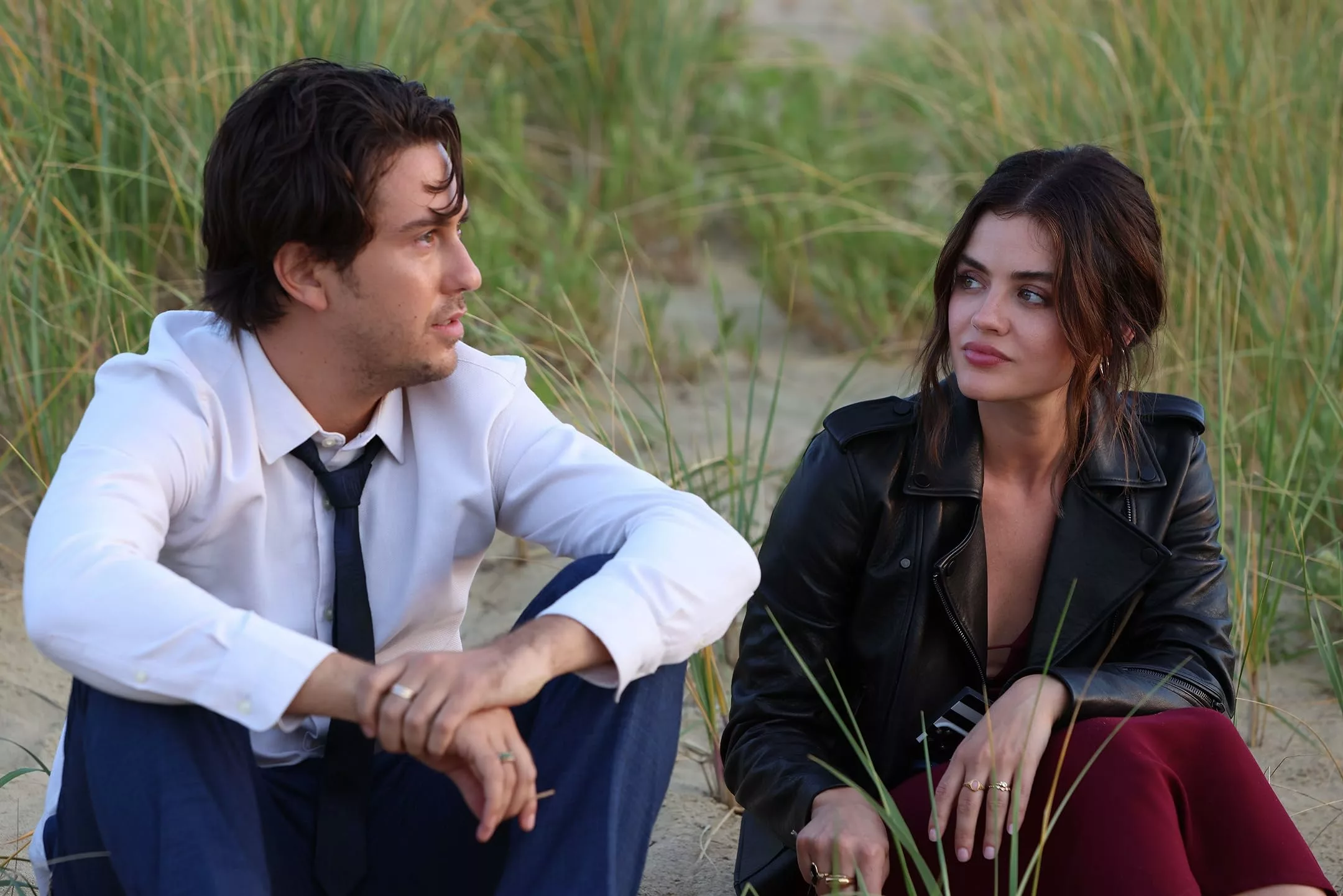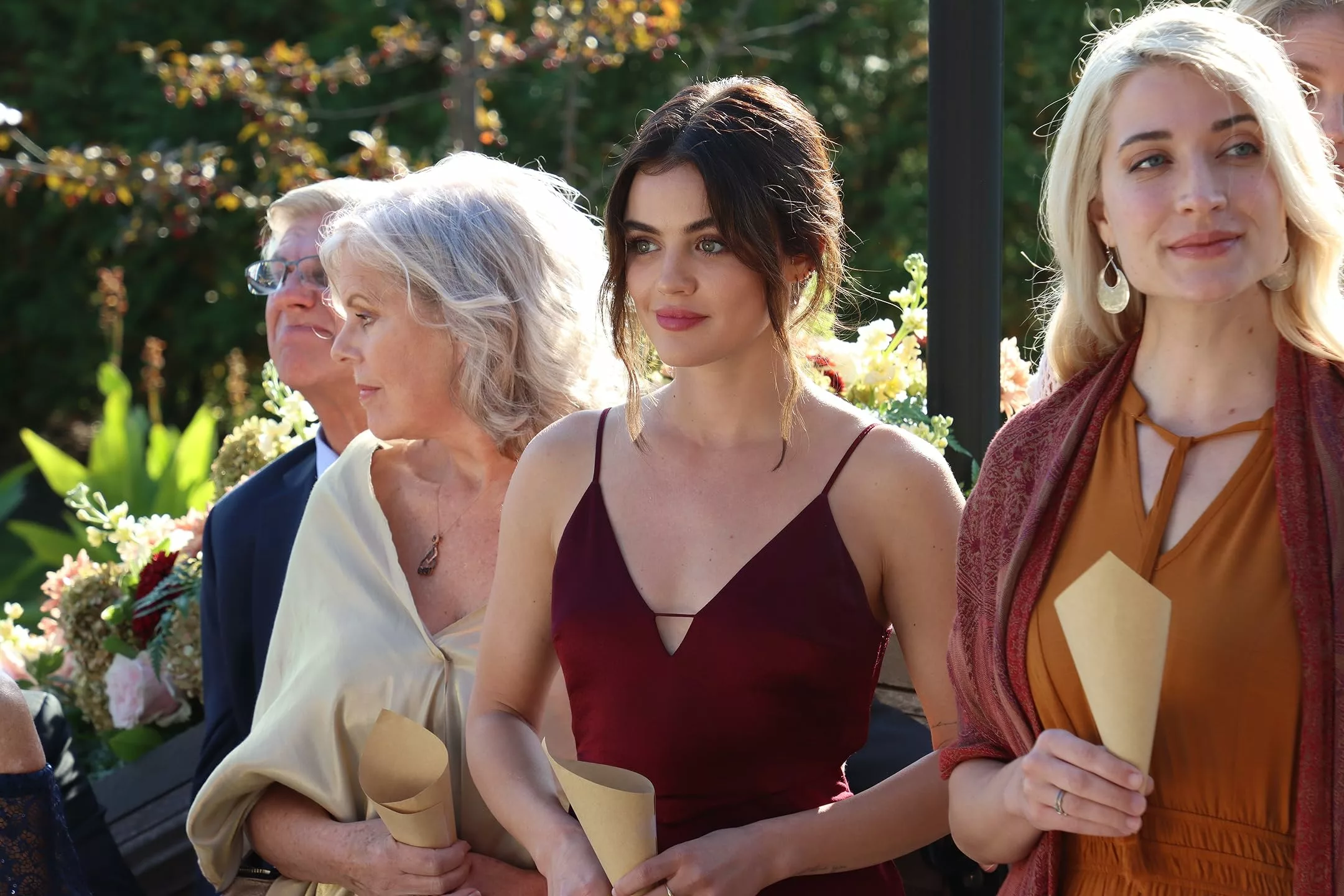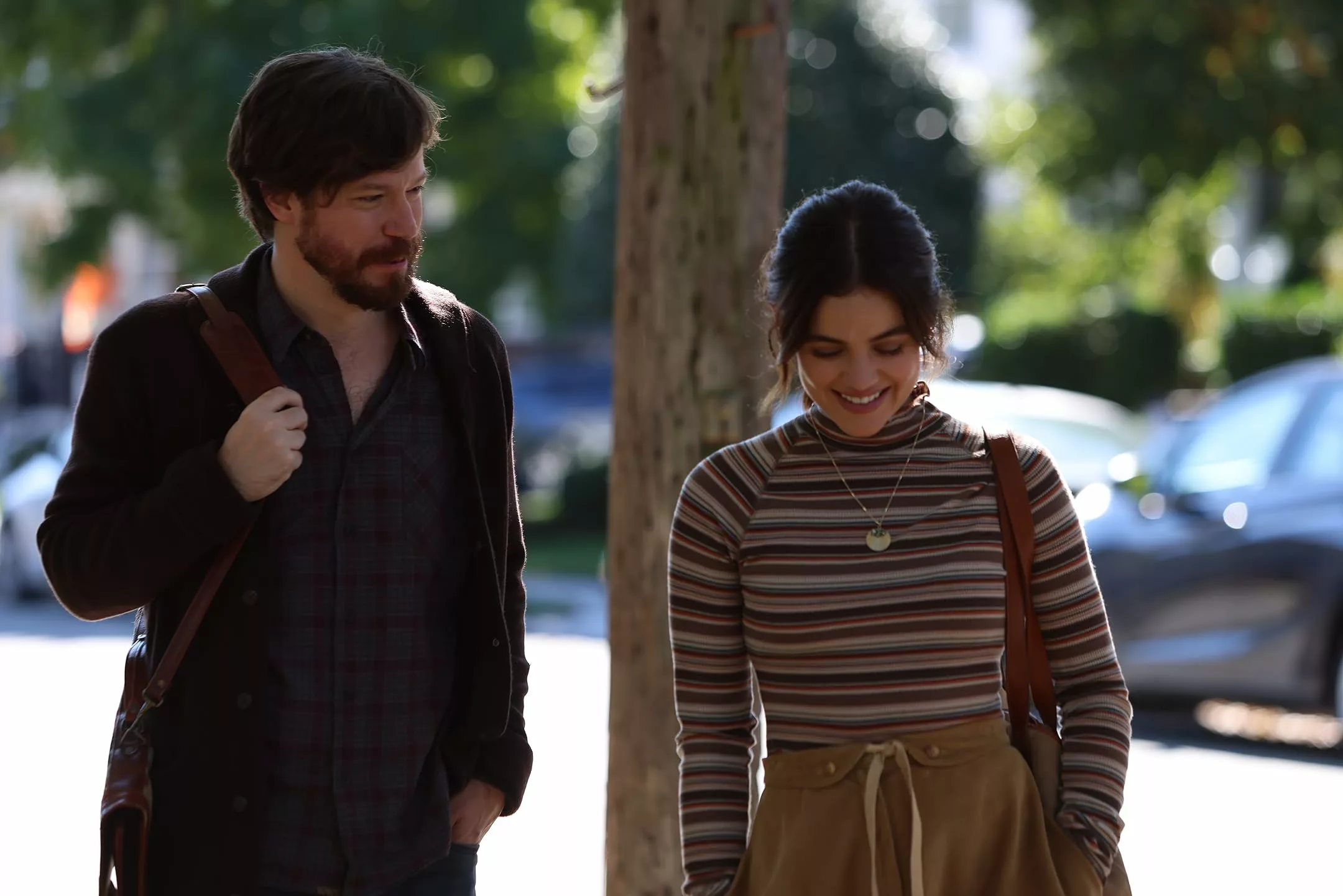In Which Brings Me to You, we’re introduced to Will and Jane, two young adults with messy romantic histories who keep striking out in love. They meet by chance at a mutual friend’s wedding, where sparks immediately fly between them.
The movie is adapted from a 2005 novel of the same name by Steve Almond and Julianna Baggott. The book unfolds through a series of letters between Will and Jane, chronicling their deepening bond and revealing intimate details of their failed past relationships. The film adaptation ditches the epistolary structure, instead showing us extended conversations between Will and Jane as they roam around town the day after the wedding, sharing those embarrassing stories face-to-face.
We get to know Will (played by Nat Wolff) as a commitment-phobe photographer who bolts at the first sign things are getting serious with a woman. Jane (played by Lucy Hale) is a serial dater of damaged men, drawn to “fixer-upper” projects who she eventually leaves when it gets to be too much. Both of them are upfront about being romantic “burnouts” yet hoping this time will be different. They feel an instant connection and want to give an actual relationship a fair shot.
As they open up about their romantic rap sheets, we start to understand the appeal of this odd couple. Can they help each other break their unhealthy patterns? The film explores whether these two jaded souls can take a chance on love again.
Sparks Fly on the Wedding Circuit
Will and Jane first lay eyes on each other at the wedding of a mutual friend. Jane notices Will slip in late to the ceremony, playfully calling him out on it afterwards at the reception. The attraction is instant – after a few drinks at the open bar, Jane impulsively invites Will to join her for a steamy hookup in the coat check.
Will is totally game at first, fueled by their palpable chemistry. But at the last second, he pulls back, cryptically telling Jane he “can’t.” Puzzled yet intrigued, Jane presses him to explain. Will then launches into a story from his failed romantic past – specifically, an embarrassing early sexual encounter. Jane finds his candor refreshing and offers up an awkward tale of her own.
And so begins an unexpected journey of bonding over romantic war stories. Will and Jane ditch the reception to wander the nearby neighborhood deep in conversation, relaying their checkered dating histories to each other. We watch through extended flashbacks as they re-live formative relationships that left scars – ill-fated affairs, heartbreaking splits, “Irish goodbyes” where one person ghosts. Both admit to unhealthy patterns – Will avoiding intimacy, Jane fixating on damaged men.
Yet as they trace their romantic failures, a closeness develops. They discover shared perspectives in their baggage. For a film centered on breakups, it paints an engaging portrait of two people tentatively moving from past hurt towards hope. From the disastrous coat check clinch to strolling the city streets, Will and Jane bare their souls in search of someone to finally love their true selves.
Finding the Funny in Heartbreak
At the core of Which Brings Me to You lies the onscreen pairing of Nat Wolff and Lucy Hale. They’re tasked with making viewers root for Will and Jane, a couple initiated in mirth that must bear the weight of some pretty raw wounds. Luckily, Wolff and Hale prove adorably matched as humorous healers.
Of the two, Hale has more experience in the rom-com realm, bringing a brightness befitting Jane’s playfully bold exterior. She pivots nimbly from batting her eyes at Will in jest to saddened recollections, hinting at frayed nerves below Jane’s breezy attitude. Hale shines especially in lighter moments – whether debating the merits of weddings with Wolff or recreating meet-cutes gone awry, her comic timing entertains.
As Will, Wolff makes an appealing guide through awkward terrain. His self-deprecating wit helps offset heavier emotions when discussing past letdowns. Dynamic chemistry with Hale allows Wolff to participate in some highly comedic exchanges that steer Which Brings Me to You from melodrama. A highlight occurs when Will reenacts losing his virginity amidst a flurry of nerves and limbs in the backseat of a car. The scene is outlandish yet tou]ching, much like Wolff’s performance.
Indeed, the actors’ collaborative comedy stylings grant the film levity. Make no mistake, Wolff and Hale tackle somber subjects too, as fizzled affairs give way to destructive vices and codependency. Thankfully the leads’ comradery sustains us through revelations of dual heartache. Wolff radiates empathy, Hale exudes tenderness, and their rapport keeps spirits aloft.
Which Brings Me to You asks much in dwelling on the romantic follies of two young adults. Fortunately, Wolff and Hale shoulder hefty emotions while handling humor. In showcasing the silly and severe, they generate the chemistry essential for viewers to will this couple towards hard-earned happiness.
“Join Lindsay Lohan in a magical journey across Ireland with our Irish Wish review. Experience the charm and whimsy of this romantic comedy that intertwines love, magic, and the lush landscapes of the Emerald Isle.”
Familiar Faces, Fleeting Roles
While centered on Lucy Hale and Nat Wolff, Which Brings Me to You features some familiar faces in supporting parts. Unfortunately, few leave much impression on the overall story.
As Jane’s hard-partying pal Audrey, Britne Oldford brings fun energy to her minor role. We glimpse her wild streak through flashes of nights out clubbing with Jane. Oldford hints Audrey cares under that party girl exterior, lightly chiding Jane’s reckless romantic choices. A touch more screen time may have better developed this friendship.
John Gallagher Jr. turns up as Jane’s professor lover, Wallace. Their teacher/student dynamic raises eyebrows and consequences once unveiled to classmates. Gallagher Jr. effectively conveys Wallace’s charisma and inner turmoil battling alcoholism. Yet like other secondary players, we only view this relationship retrospectively through Jane’s eyes rather than experiencing those highs and lows firsthand.
On Will’s side, musician Alexander Hodge plays Elton, part of Will’s old bandmate. We gather Elton knows Will pretty well, enough to call him out for avoiding real relationships. But their friendship is primarily summarized versus shown. Genevieve Angelson as Eve, an older woman whom Will casually dates and inevitably bolts from, delivers a fine if unmemorable performance in a role that feels more plot device than fully actualized character.
While these satellites orbit our main pair, none profoundly impact the trajectory of Will and Jane’s ever-intensifying bond over 24 hours. Watcher interest relies squarely on Hale and Wolff sustaining our emotional investment as they replay past pains. Support players fade into the background, their purpose primarily to propel nostalgic arcs for our bruised yet still hoping lovers.
Finding the Right Tone
In mining melancholy backstories for renewed hope, Which Brings Me to You tries walking a tonal tightrope. It wants to explore emotional trauma while keeping spirits uplifted enough for romance to bloom. But that balance between humorous and serious rarely feels steady.
The film establishes itself squarely as a comedy upfront – Will and Jane’s meet-cute plays out through playful banter and a lusty coatroom proposition. Even when reminiscing about past heartbreaks, the leads keep things initially bright, joking about fumbled first times and nightmare one night stands.
Yet as we dig deeper into Will and Jane’s romantic rap sheets, a gloomier tone takes over. The stories grow darker – relationships clouded by secrecy, infidelity, even grief. Dire moments get relayed via extended flashbacks, rarely allowing the grimness to dissipate before heading into yet another melancholic tale.
While compelling backstories, without proper comic relief these downward spirals grow exhausting. Worse, we’re told about trauma indirectly through Will and Jane’s filters rather than experiencing pivotal events firsthand. This repetitive structure denies us intimate understanding of what precisely scarred these characters so. Removed from the action itself, it’s difficult connecting deeply to either Will or Jane’s sadness.
That’s not to say a rom-com can’t or shouldn’t explore profound pain. But the tonal imbalance in Which Brings Me to You means we get neither the catharsis of drama nor the effervescence of a romance. The leads’ pitched banter strives towards comedy, yet feels hollow against such bleak backdrops. Weighty subject matter deserves its due; unfortunately somber souls Will and Jane never quite earn those lighthearted moments the film tries engineering.
A Familiar Formula
On a technical level, Which Brings Me to You offers few surprises. Director Peter Hutchings brings workmanlike proficiency but little flair behind the camera. Standard framing and lighting choices fail to enhance the script’s frequent flashbacks. Those trips down memory lane cry out for a more imaginative vision.
The time-hopping structure provides insight into Will and Jane’s past romances yet grows repetitive in execution. We continually ping-pong between the leads as they relay failed affairs, unhappy endings stacked atop one another. While this back and forth movement mimics the conversational flow between Will and Jane, the device wears thin over a full movie.
More inventive editing could potentially keep these one-sided stories lively, layering in temporal shifts or poetic match cuts between fledgling relationships. Instead, a journey defined by heartache turns into a plodding progression of bad breakups.
On the plus side, scenes situated in the “present day” play out with casual realism thanks to Hale and Wolff’s naturalistic performances. Their charming chemistry enlivens standard walking-and-talking shots along neighborhood blocks. Certain song cues land as well, especially a ukulele-backed montage that nods to signature rom-coms.
Yet mostly by-the-book direction and formatting prevent Which Brings Me to You from standing out among its well-worn genre. We expect these movies to speak uniquely about the strange nature of love itself. But the film’s execution lacks the inventiveness required to make old hat feel hat-in-hand hopeful again.
Looking for Love in All the Wrong Places
Past the parade of botched romances, What Brings Me to You strives to share some resonant truths about the rocky road towards intimacy. It explores why even the most self-assured among us falter repeatedly in securing that elusive loving connection.
Through Will and Jane’s stories, we glimpse the baggage that builds over years of trusts betrayed, hearts broken. Both leads bare patterns holding them back – for Will, an inability to commit beyond the honeymoon phase. For Jane, a penchant for trying to “fix” men who prove irreparable.
In shining light on those pitfalls, the movie suggests insight and transparency as keys to overcoming self-destructive cycles. We watch Will and Jane peel back layers revealing long-buried wounds. There’s a sense that real change comes not necessarily through finding the “right” partner but doing internal work first.
Flitting amidst heavier life lessons are lighter truths about our shared romantic follies. Many moments poke gentle fun at the white lies and false fronts embedded in early courtship. In exposing youthful insecurities around sex and intimacy, Which Brings Me To You makes the case for embracing our perfectly imperfect selves.
The film ultimately serves as an ode to vulnerability, to dropping those well-curated facades in hope of forging authentic bonds. Two people daring to bare their whole messy histories without judgment. Through even life’s darkest chapters, there lies promise of compassion renewed, emotional walls dismantled – a triumphant truth for cynical souls wary of baring their hearts once more.
Signs of Love Amidst the Heartbreak
In the end, Which Brings Me to You tells an overly familiar tale of romantic hardship with few unique storytelling flourishes. What makes the journey worthwhile lies in Lucy Hale and Nat Wolff’s winsome double act as misguided lovers. Their playful rapport and emotional authenticity resonate louder than all the film’s formulaic flashbacks of affairs gone awry.
While admirably adult in tackling relationship baggage head-on, the script leans too heavily into characters re-telling past pain versus letting us experience those potent moments firsthand. The trauma becomes abstracted. Combine a repetitive structure with an uncertain tone, and dramatic catharsis gets lost along the way.
Still, Hale and Wolff form a compelling duo, their hopeful chemistry ultimately outshining the movie’s flaws. They raise the film’s watchability factor for fans seeking a subdued yet charming romantic lead showcase. Viewers less enthralled by standard meet-cute contrivances may lose patience with yet another quirky, hot couple trading banter and sob stories over 24 slight hours.
I’d gently recommend Which Brings Me to You for diehard fans of actor-centric romance movie3. Undemanding date night devotees should find enough affable moments to counterbalance its drearier detours. Just don’t expect the comedy or heartache to linger for long afterwards. This is comfort viewing rather than enduring cinema.
In the final assessment, Hale and Wolff breathe soul into what’s otherwise a pedestrian two-hander affair. Here’s hoping they net better big screen vehicles moving forward to flaunt their obvious chemistry. Which Brings Me to You doesn’t manage the tricky alchemy of laughing through tears – but its leads hint they hold that magic for future films ready to fully unleash it.
The Review
Which Brings Me to You
Which Brings Me to You offers glimmers of romantic hope, but its uneven tone and repetitive structure prevent the film from capturing the full chemistry of appealing leads Lucy Hale and Nat Wolff.
PROS
- Lucy Hale and Nat Wolff have an engaging rapport and chemistry
- Moments of levity and humor between the leads
- Attempts to tackle relationship baggage in a mature way
CONS
- Uneven tone between comedy and drama
- Repetitive structure going through past relationships
- Lack of connection to secondary characters
- Standard execution lacks flair






















































